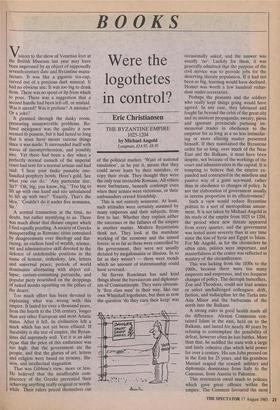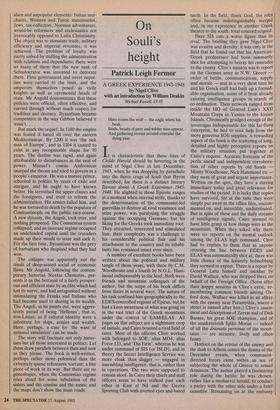BOOKS
Visitors to the show of Venetian loot at the British Museum last year may have been impressed by an object of supposedly seventh-century date and Byzantine manu- facture. It was like a gigantic tea-cup, carved out of a precious dark mineral. It had no obvious use. It was too big to drink from. There was no spout or lip from which to pour. There was a suggestion that a second handle had been left off, or mislaid. Was it sacred? Was it profane? A mistake? Or a joke?
It gleamed through the dusky room, Presenting unanswerable problems. Re- fined inelegance was the quality it now seemed to possess, but it had lasted so long that it must have meant various things since it was made. It surrounded itself with waves of incomprehension, and possibly awe. Yet there had been a day when a Perfectly normal eunuch of the imperial court had sent for a normal artisan and had said:. 'I hear your make passable one- handled porphyry bowls. Here's gold. See what you can do.' Any particular size, Sir?"Oh, big, you know, big.' Too big to lift up with one hand and too unbalanced to lift up with two?"Exactly. That's the idea.' Couldn't do it under five nomisma, Sir.'
A normal transaction at the time, no doubt, but rather mystifying to us. There was much about that distant empire which I find equally puzzling. A society of Greeks masquerading as Romans; cities convulsed by disagreements over theology and flat- racing; an endless fund of wealth, science, wit and administrative skill devoted to the defence of indefensible positions in the name of honour, orthodoxy, law, letters and universal peace; periods of world dominance alternating with abject col- lapse; caviare-consuming patriarchs, and Popular piety nourished on the droppings of naked monks squatting on the pillars of the desert.
Too much effort has been devoted to explaining what was wrong with this empire. It lasted for over a thousand years, from the fourth to the 15th century, longer than any other European and most Asiatic states. After it fell, its civilisation left a mark which has not yet been effaced. If durability is the test of empire, the Byzan- tines did supremely well. Yet it is an idee recite that the price of this endurance was too high: that the government ate the people, and that the glories of art, letters and religion were based on tyranny, illu- sion, and intellectual stagnation. That was Gibbon's view, more or less. He believed that the insufferable com- placency of the Greeks prevented their achieving anything really original or worth- while. Their rulers priced themselves out
Were the logothetes in control?
Eric Christiansen
THE BYZANTINE EMPIRE 1025-1204 by Michael Angold Longman, £14.95, £8.95 of the political market. 'Want of national emulation', as he put it, meant that they could never learn by their mistakes, or copy their rivals. They thought they were the only true invincible Romans. All others were barbarians, beneath contempt even when their armies were victorious, or their ambassadors craved friendship.
This is not entirely nonsense. At least, such attitudes were certainly assumed by many emperors and their subjects, from first to last. Whether they explain either the successes or the failures of the empire is another matter. Modern Byzantinists think not. They look at the mundane working of the economy and the armed forces: in so far as these were controlled by the government, they were not usually dictated by megalomania or illusion. In so far as they weren't — there were trends which no amount of statesmanship could have reversed.
Sir Steven Runciman has said kind things about the bureaucrats and diplomat- ists of Constantinople. They were obvious- ly 'first class men' in their way, like our own Whitehall logothetes, but then as now the question `do they earn their keep' was occasionally asked, and the answer was usually `no'. Luckily for them, it was generally admitted that the purpose of the civil service was to provide jobs for the deserving literate population. If it had not been so big, learning would have declined. Homer was worth a few hundred redun- dant under-secretaries.
Perhaps the peasants and the soldiers who really kept things going would have agreed. In any case, they laboured and fought far beyond the orbit of the great city and its insistent propaganda; sweaty, pious and ignorant provincials pursuing im- memorial trades in obedience to the emperor for as long as a no less intimidat- ing or more alluring master presented himself. If they maintained the Byzantine order for so long, over much of the Near East and the Balkans, it must have been despite, not because of the workings of the court and administration in the capital. It is tempting to believe that the empire ex- panded and contracted in the mindless and passive way of a giant sea-weed, rather than in obedience to changes of policy. Is not the elaboration of government usually in inverse proportion to its effectiveness?
Such a view would reduce Byzantine politics to a sort of metropolitan amuse- ment. It is not taken by Michael Angold in his study of the empire from 1025 to 1204, the period when new threats appeared from every quarter, and the government was tested more severely than at any time since the loss of Syria and Egypt to Islam. For Mr Angold, as for the chroniclers he often cites, politics were important, and masterfulness at the centre was reflected in mastery of the circumference.
This was lacking from the 1030s to the 1060s, because there were too many emperors and empresses, and too frequent changes of policy. The decrepit butterflies, Zoe and Theodora, could not lead armies or select unchallenged colleagues: drift, faction, and indiscipline let the Turks into Asia Minor and the barbarians of the north into the Balkans.
A strong ruler in good health made all the difference. Alexius Comnenus con- tained Islam in the east, held on to the Balkans, and lasted for nearly 40 years by refusing to contemplate the possibility of defeat, however often he lost battles. More than that, he saddled the state with a large and fairly cohesive clan which held power for over a century. His son John pressed on in the East for 25 years, and his grandson Manuel reaped the reward: military and diplomatic dominance from Italy to the Caucasus, from Austria to Palestine.
This restoration owed much to policies which gave great offence within the empire. The Comneni favoured the most alien and unpopular elements: Italian mer- chants, Western and Turcic mercenaries, Jews, tax-collectors, Norman adventurers, would-be reformers and ecclesiastics not irrevocably opposed to Latin Christianity. The object was to stimulate trade, military efficiency and imperial revenues; it was achieved. The problem of loyalty was partly solved by stuffing the administration with relations and dependants; there were so many of them that the new rank of Sebastocrator was invented to decorate them. Firm government and overt nepot- ism were carried to the limit, and the emperors themselves posed as virile knights as well as ceremonial heads of state. Mr Angold demonstrates that these policies were official, often effective, and carried through without much respect for tradition and decency. Byzantium became competitive in the way Gibbon believed it wasn't.
But mark the sequel. In 1180 the empire was feared if hated all over the eastern Mediterranean. By 1200 it was 'the sick man of Europe', and in 1204 it ceased to exist in any recognisable shape for 70 years. The decline was rapid, and again attributable to disturbances in the seat of power. Manuel's cousin Andronicus usurped the throne and tried to govern as a people's emperor. He was a mature prince, schooled in politics by years of exile and intrigue, and he ought to have known better. He terrorised the upper classes and the foreigners, and tried to reform the administration. His armies failed him, and he was tortured to death by the populace of Constantinople on the public race-course. A new dynasty, the Angeli, took over, and nothing prospered. The Comnenian system collapsed, and an insecure regime occupied an undefended capital until the crusaders made up their minds to seize and sack it. For the first time, Byzantium was the prey of barbarians who despised what they had won.
The collapse was apparently not the result of deep-seated social or economic flaws. Mr Angold, following the contem- porary historian Nicetas Choniates, pre- sents it as the betrayal of a fairly prosper- ous and efficient state by an elite which had lost its nerve, and had antagonised without intimidating the Franks and Italians who had become used to sharing in its wealth. The Angeli, as he points out, were aggres- sively proud of being `Hellenes', that is, non-Latins; as if cultural identity were a substitute for ships, armies and wealth. Here, perhaps, a case for 'the want of national emulation' can be made.
The story will fascinate not only histor- ians but all those interested in politics. Let them draw parallels between then and now as they please. The book is well-written, perhaps rather more polemical than the extremely sparse references warrant; a fine piece of work in its way. But there are no genealogies, when the Comnenian regime cries aloud for some tabulation of the sisters and the cousins and the aunts; and the maps don't show the main roads.















































 Previous page
Previous page